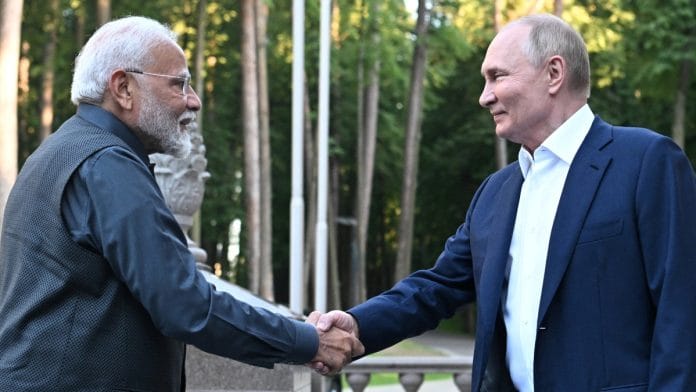Prime Minister Narendra Modi’s recent visit to Poland and Kyiv has evoked considerable global interest, praises, and flak in more or less equal measure. While the trip to Poland, a former Warsaw Pact Organisation member but never part of the Soviet Union and India’s key economic partner in Central Europe, was important, the Kyiv visit has greater significance in the current context. The visit, which happened a day prior to Ukraine’s Independence Day, 24 August, underlines New Delhi’s commitment to uphold Kyiv’s sovereignty and autonomy. The Prime Minister also emphasised the need to resolve the Russia-Ukraine conflict through negotiations, a point he made in Moscow as well during his meeting with Russian President Vladimir Putin in early July this year.
Ukraine witnessed a second independence struggle in February 2014. That month, on Kyiv’s Maidan Nezalezhnosti, meaning the Independence Square, Ukraine embarked on a new path of progress, with a resolve to start a new beginning of socio-economic programme that aimed to bring back the country’s glory and, of course, self-esteem.
The Maidan Revolution and the formulation of the European Union’s Association Agreement laid the foundation of a long-term EU-Kyiv partnership. Signed in 2014 and ratified in 2017, the Association Agreement had both political and economic components. The Deep and Comprehensive Free Trade Agreement allowed Ukraine to access the EU single market, but, in the bargain, the political establishment in Kyiv had to be prepared for substantial policy reforms. Ironically, membership of the quarter-century-old residue of World War II, the North Atlantic Treaty Organisation (NATO), was not among the proposed reforms.
NATO’s eastward expansion and agenda to go beyond the Euro-Atlantic area to recruit ‘partners across the globe’ brought Kyiv within its ambit, like its engagement with Pakistan to supposedly promote stability in the region and to defeat extremism. Both, to say the least, were failed objectives. In 2014, after Russia annexed Crimea, NATO expelled eight Russian officials from its Brussels office, leading to the closure of the alliance’s office in Moscow. Strangely, some academics in Ukraine, probably supported by pro-Pakistan elements, began comparing Crimea and Kashmir (“Is Crimea going to be a Kashmir of Europe?”), while in 2017, Kyiv began selling engines for Pakistani tanks to support their military modernisation programme and offered to sell 100 T-84 Oplot main battle tanks (MBT), which deal did not materialise. Incidentally, in the 1990s, the Ukrainian defence industry supplied 320 T-84UD tanks to Pakistan’s military under a deal worth some $600 million. Kyiv should be thankful that PM Modi put his best diplomatic foot forward and refrained from raising inconvenient questions.
Also read: Modi-Putin meeting should open US’ eyes. This is how you protect national interest
US & demand for absolute loyalty
India has always held that while Kashmir is a bilateral subject between New Delhi and Islamabad, issues like Crimea should be settled bilaterally between Ukraine and Russia instead of being internationalised. This was India’s stand when Prime Minister Modi visited Moscow and now Kyiv. The White House should take note of this.
Unlike the United States, which expects other countries to show absolute allegiance only to America and none else, an extension of the “If you are not with us you are against us” adage, Russia does not expect any such total and absolute loyalty. Moscow did not raise hackles over PM Modi’s Ukraine visit or India’s defence and other deals with the US or EU, which have overtly taken an anti-Russia stand and asked Delhi to refrain from dealing with Russia.
A tectonic shift
The end of the Cold War and the disintegration of the former Soviet Union signified a tectonic shift in India’s conduct of its foreign policy. While the shift from non-alignment to strategic autonomy and multilateralism had already begun, New Delhi recognised the need to come to terms with the diminishing influence of the once-powerful USSR. The post-disintegration decade of Moscow’s foreign, economic, and defence policies, mainly reversing the China-Soviet schism had left New Delhi with little choice but to wait and watch its non-alignment struggling for survival. The advent of Putin as Russia’s strongman, US criticism of the Russian crackdown in Chechnya and Crimea, and NATO’s eastward expansion much to the detriment of Russia’s influence in its erstwhile federations brought Putin to the centre stage of Eurasian politics. As Putin consolidated his position in Moscow, New Delhi got its acts together to deal with a strong Russia minus its resource-rich geography, which was a setback economically but not as much militarily. Prime Minister Manmohan Singh made nine visits to Russia on several occasions, logging an equal number of trips to the US as well. If these were ‘balancing acts’, so are PM Modi’s six visits to Russia and eight to the US so far.
The PM’s visits to Moscow and Kyiv and the phone calls from US President Joe Biden and Putin affirm New Delhi’s needs, capacity, and capabilities to maintain strategic balance in international relations and advocate peaceful resolution of conflicts through negotiations.
The current world order is different from its earlier editions defined by non-alignment, bipolarity, unipolarity, and race for the superpower slot. The geopolitical dynamics defy some of the set theories and have moved toward a multipolar world order where maintaining a balance between national interests and bilateral, regional, and global alignments are the new normal.
Seshadri Chari is the former editor of ‘Organiser’. He tweets @seshadrichari. Views are personal.
(Edited by Humra Laeeq)






